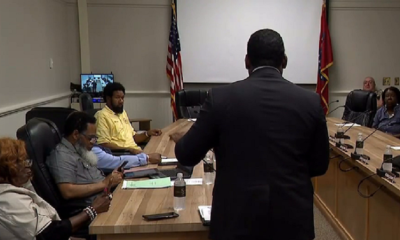Local News
A city in Arkansas honors an ex-slave who escaped to Canada and was subsequently extradited

Fayetteville, Arkansas – In the place where he formerly toiled, an enslaved man who fled Arkansas in 1841 in search of freedom in Canada was commemorated with a historical marker and a new street sign.
Nelson Hackett’s exceptional extradition from Canada in 1842 on a larceny accusation caused a stir in the British colony, which had long been regarded as a sanctuary for runaway slaves. A few months later, the British government implemented regulations that “made similar extraditions extremely difficult,” according to the Nelson Hackett Project, an online public scholarly project run by the University of Arkansas Humanities Center.
According to academics, Canada never again sent an escaped slave back to the United States.
The Northwest Arkansas Democrat-Gazette reported that a marker recognizing Hackett and his influence was erected in the downtown plaza of Fayetteville on Friday.
According to the newspaper, Archibald Yell Boulevard is being renamed Nelson Hackett Boulevard. This is a particularly meaningful move given the part Yell, who was the governor of Arkansas at the time, played in securing Hackett’s extradition. The new street signs, which were also unveiled on Friday, will be put in place on Juneteenth Monday.
According to Michael Pierce, an associate history professor at the University of Arkansas at Fayetteville, Hackett left Arkansas in July 1841, which prompted the man who claimed to be his owner to request his extradition on charges of theft. Yell requested the return of Hackett in a letter to the Canadian colonial governor. The demand was approved.
In the summer of 1842, Hackett was brought back to Fayetteville. According to experts, he was repeatedly publicly whipped, subjected to torture, and bought back into slavery in Texas. Again getting away, his whereabouts are still unclear.
Hackett toiled close to the location of the memorial on the square. Hackett’s experiences are commemorated by the memorial and the renamed roadway, according to Mayor Lioneld Jordan.
The Black Heritage Preservation Commission of the city, which is led by J.L. Jennings, suggested to the City Council that the street’s name be changed and that a marker be erected in the square. According to him, the commission has been trying to bring the city’s little-known past to light and to foster a sense of community among all citizens. “We believe honoring Nelson Hackett is an important first step in this goal,” Jennings said. “It’s remarkable to think an enslaved Mr. Hackett could have actually stood here, where his marker is installed today, unknowing of the impact that his life would have on the world. While we do not know how Mr. Hackett’s story ended, what we do know is his impact was felt by thousands.”
-

 Local News2 weeks ago
Local News2 weeks agoArkansas State Police seize over 4,000 pounds of illegal drugs in highway traffic stops
-

 Local News2 weeks ago
Local News2 weeks agoLittle Rock and North Little Rock will see lane restrictions along Interstate 30
-

 Local News1 week ago
Local News1 week agoJefferson County is dysfunctional due to a dispute between the judge and justices
-

 Local News2 weeks ago
Local News2 weeks agoSeveral recently painted murals in Little Rock’s downtown
-

 Local News6 days ago
Local News6 days agoMay Fest 2024 promises a joyful street
-

 Local News2 weeks ago
Local News2 weeks ago$20 million grants will be funded by the Arkansas Department of Human Services for pilot project
-

 Local News2 weeks ago
Local News2 weeks agoA church in Fredonia becomes a museum with a mission of conserving African American history
-

 Local News2 weeks ago
Local News2 weeks agoThe 50th season of the Little Rock Farmers Market begins






Leave a Reply